
Jan 31, 2024 | Non categorizzato
On Jan. 18, 2024, some young people from various countries from the International Center of the Focolare Movement, accompanied by their leaders, visited the Youth Office of the Dicastery for Laity, Family and Life to present the upcoming Genfest. A very enriching meeting was held on January 18 by some young people of various nationalities from the International Center of the Focolare Movement at the Youth Office of the Dicastery for the Laity, Family and Life. They were welcomed by Father João Chagas, head of the Office, Gleison De Paula Souza, secretary of the Dicastery, and the whole team. The objective of this meeting was to present the upcoming Genfest, the world event promoted by the youth of the Focolare Movement, which will be held in July 2024 in Brazil and will also involve other Latin American countries in the first phase.  “During this meeting we had the opportunity to share our most important personal experiences in view of Genfest 2024,” Mariane (Brazil) tells us. Moreover,” she continues, “I perceived that we were in a welcoming environment that reflected the diversity and interculturality that also characterizes us at the International Focolare Center. “It was my first time attending a meeting at the Vatican,” says Sole, representing the youths of Asia. “Previously I thought the Church was serious and authoritative. Instead, I was struck by this desire to listen to the voices of young people.” The young people, after introductions and initial moments of exchange, were able to discuss various topics with those present. “The members of the Office, together with Fr. Chagas, told us about the work done for World Youth Day (WYD) held in 2023 in Lisbon (Portugal),” says Maria José (Venezuela), “and invited us to tell what the experience was like for those of us who were able to participate. Finally, we talked about our work for Genfest in its different phases. What struck me most was feeling the family atmosphere. They expressed their great confidence in the project we are pursuing. We are aware that there are challenges, but this is also a richness that invites us to move forward.” “Juntos para cuidar” (Together to care) is the theme chosen for the upcoming Genfest, and it was precisely the concept of “togetherness,” of “synodality,” that became a point of great reflection during this meeting. “During this dialogue,” David (Venezuela) recounts, “Secretary Gleison De Paula Souza mentioned the Gospel of Mark (cf. Mk. 10:46-52), in which the blind Bartimaeus is mentioned. He used this biblical passage to talk about synodality, about going to those who are rejected to welcome them and make them feel loved. I had the feeling that God was saying, ‘This is the path we must follow. Moreover, I think that, every day, we can meet people who are inspired by the Holy Spirit and, as a Church, we have to be open to listen to everything that comes from outside as well. This is synodality for me.” In her experience, however, Masha (Russia) who belongs to the Russian Orthodox Church, synodality is walking together in diversity without fear: “It is going out to meet the other, finding a common language, the one that comes directly from each person’s heart; it is going out to meet a brother or sister of a different denomination, a non-believer, but without effort. Only with the desire to witness and go. There will be no future if we do not make this journey together.” At the conclusion of this moment, Father João Chagas, head of the Office expressed his joy for this moment of such a participatory and lively exchange, a moment that enriched him personally. We share in the following video some impressions about it and his best wishes for the upcoming Genfest.
“During this meeting we had the opportunity to share our most important personal experiences in view of Genfest 2024,” Mariane (Brazil) tells us. Moreover,” she continues, “I perceived that we were in a welcoming environment that reflected the diversity and interculturality that also characterizes us at the International Focolare Center. “It was my first time attending a meeting at the Vatican,” says Sole, representing the youths of Asia. “Previously I thought the Church was serious and authoritative. Instead, I was struck by this desire to listen to the voices of young people.” The young people, after introductions and initial moments of exchange, were able to discuss various topics with those present. “The members of the Office, together with Fr. Chagas, told us about the work done for World Youth Day (WYD) held in 2023 in Lisbon (Portugal),” says Maria José (Venezuela), “and invited us to tell what the experience was like for those of us who were able to participate. Finally, we talked about our work for Genfest in its different phases. What struck me most was feeling the family atmosphere. They expressed their great confidence in the project we are pursuing. We are aware that there are challenges, but this is also a richness that invites us to move forward.” “Juntos para cuidar” (Together to care) is the theme chosen for the upcoming Genfest, and it was precisely the concept of “togetherness,” of “synodality,” that became a point of great reflection during this meeting. “During this dialogue,” David (Venezuela) recounts, “Secretary Gleison De Paula Souza mentioned the Gospel of Mark (cf. Mk. 10:46-52), in which the blind Bartimaeus is mentioned. He used this biblical passage to talk about synodality, about going to those who are rejected to welcome them and make them feel loved. I had the feeling that God was saying, ‘This is the path we must follow. Moreover, I think that, every day, we can meet people who are inspired by the Holy Spirit and, as a Church, we have to be open to listen to everything that comes from outside as well. This is synodality for me.” In her experience, however, Masha (Russia) who belongs to the Russian Orthodox Church, synodality is walking together in diversity without fear: “It is going out to meet the other, finding a common language, the one that comes directly from each person’s heart; it is going out to meet a brother or sister of a different denomination, a non-believer, but without effort. Only with the desire to witness and go. There will be no future if we do not make this journey together.” At the conclusion of this moment, Father João Chagas, head of the Office expressed his joy for this moment of such a participatory and lively exchange, a moment that enriched him personally. We share in the following video some impressions about it and his best wishes for the upcoming Genfest.
Maria Grazia Berretta
Watch the video (activate English subtitles) https://youtu.be/ul4JF7f8Zg8

Jan 25, 2024 | Non categorizzato
From Mexico City the story of a meeting between Christians of various Churches in which the local Focolare community also participated “Silence is essential in the journey of Christian unity. Indeed, it is fundamental to prayer, from which ecumenism begins and without which it is sterile.”[1] Pope Francis expressed himself in this way on September 30, 2023, in St. Peter’s Square, surrounded by Christian brothers and sisters of various denominations who had come for the ecumenical vigil that preceded the Synod. And this is the spirit that also animates the Week of Prayer for Christian Unity from January 18-25, 2024, celebrated around the world, invoking unity among all Churches and ecclesial communities. But unity is not to be sought only this week; it is a commitment to be lived throughout the year. 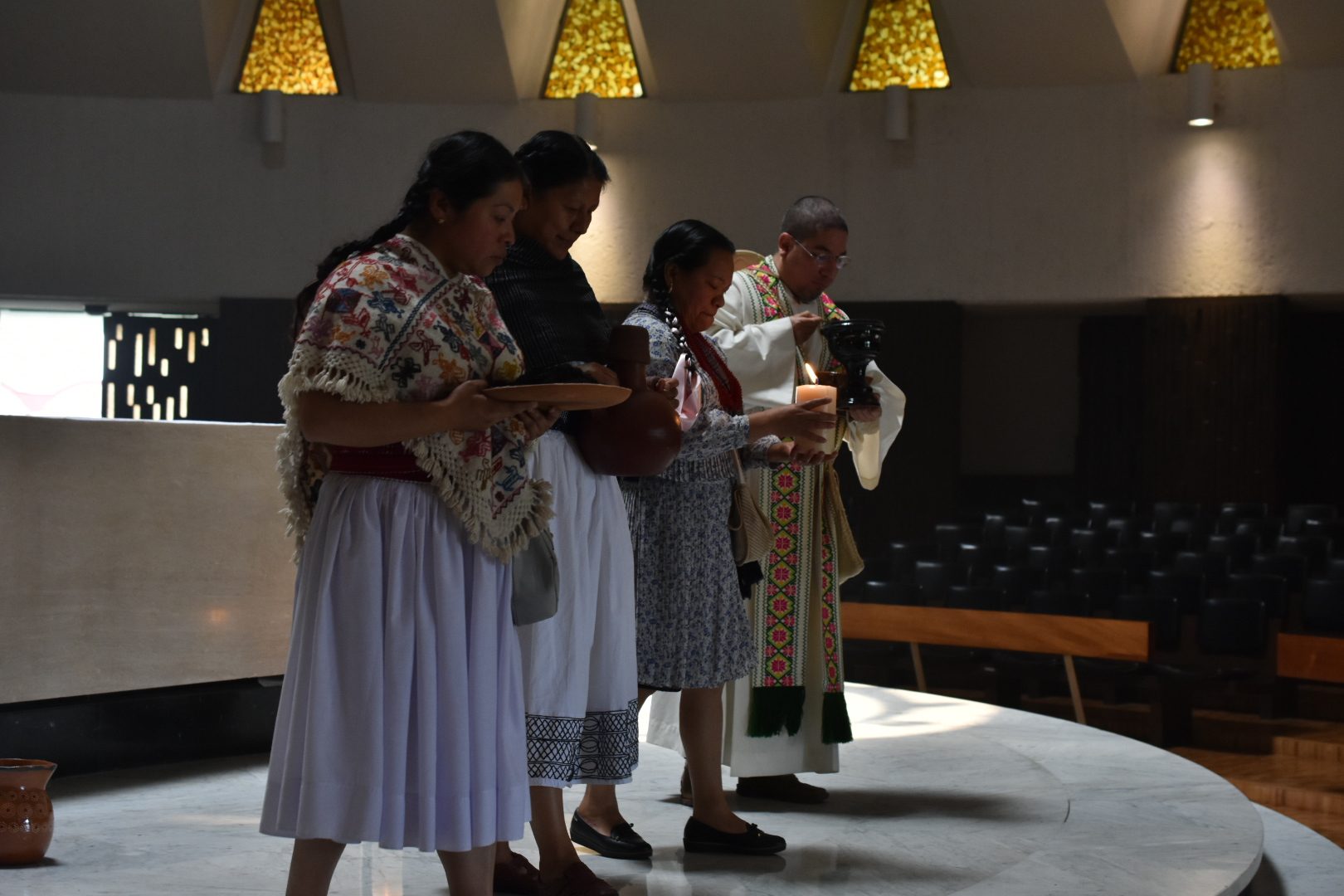 This is well known by the friends of the Focolare Movement community in Mexico City who, a few months ago, organized a day of dialogue among Christians of various Churches linked to the World Day of Prayer for the Care of Creation in collaboration with the Integral Ecology Commission of the Archdiocese of Mexico City. After an initial time of prayer in the beautiful chapel of the Archdiocesan Minor Seminary, participants went on an ecological walk led by some women from different indigenous communities. Indeed, these communities have a deep relationship with Creation, which they manifest with symbols, songs and prayers in their languages. Particularly, it became evident how water is an essential element for the life of all living beings without distinction. And the symbol of flowing water – an ecological, life-giving and synodal image – was echoed when, thirsty after the walk, the leaders of the Churches present – Anglican bishops of Mexico and priests of the Orthodox Church of America – took earthenware jugs to serve drinks to each of those present, also in small earthenware cups.
This is well known by the friends of the Focolare Movement community in Mexico City who, a few months ago, organized a day of dialogue among Christians of various Churches linked to the World Day of Prayer for the Care of Creation in collaboration with the Integral Ecology Commission of the Archdiocese of Mexico City. After an initial time of prayer in the beautiful chapel of the Archdiocesan Minor Seminary, participants went on an ecological walk led by some women from different indigenous communities. Indeed, these communities have a deep relationship with Creation, which they manifest with symbols, songs and prayers in their languages. Particularly, it became evident how water is an essential element for the life of all living beings without distinction. And the symbol of flowing water – an ecological, life-giving and synodal image – was echoed when, thirsty after the walk, the leaders of the Churches present – Anglican bishops of Mexico and priests of the Orthodox Church of America – took earthenware jugs to serve drinks to each of those present, also in small earthenware cups. 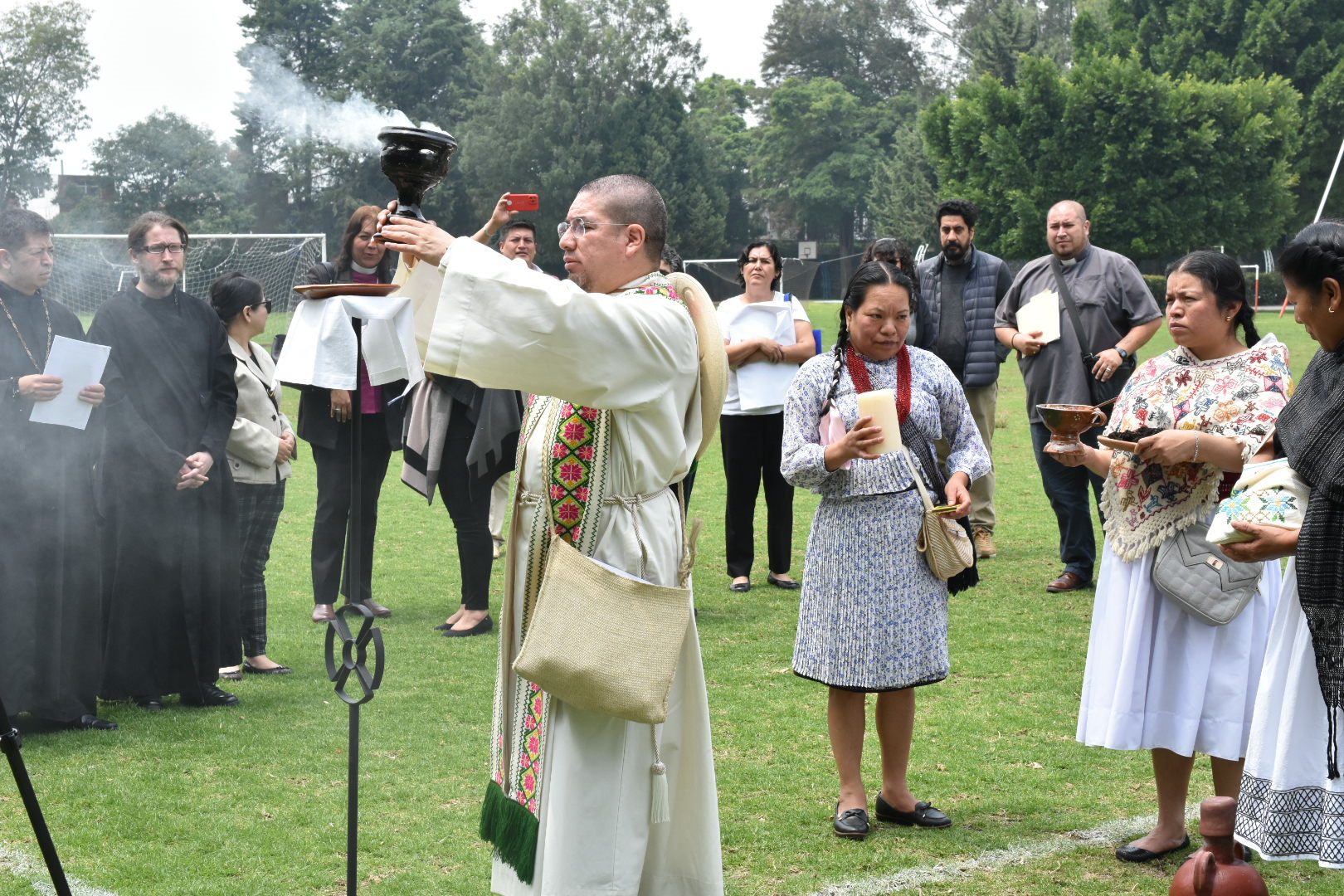 The concluding fraternal agape was a time of exchange and closeness, sharing of dreams and possible future plans. Among those present were the Anglican Primate of Mexico, the Catholic Bishop of Mexico City, an Anglican deaconess, some members of the Antiochian Orthodox Church, Catholic priests from the diocesan offices for Ecumenism, Youth Ministry and Care of Creation a group from the Community of Sant’Egidio, some members of the Commission for Integral Development of the Catholic Bishops’ Conference of Mexico, the Mexican Institute of Social Doctrine, and the Pastoral Care of Indigenous People. It was a moment of great unity in which everyone could see that it is worthwhile to spare no effort to help generate a dialogue of life in Mexico and everywhere.
The concluding fraternal agape was a time of exchange and closeness, sharing of dreams and possible future plans. Among those present were the Anglican Primate of Mexico, the Catholic Bishop of Mexico City, an Anglican deaconess, some members of the Antiochian Orthodox Church, Catholic priests from the diocesan offices for Ecumenism, Youth Ministry and Care of Creation a group from the Community of Sant’Egidio, some members of the Commission for Integral Development of the Catholic Bishops’ Conference of Mexico, the Mexican Institute of Social Doctrine, and the Pastoral Care of Indigenous People. It was a moment of great unity in which everyone could see that it is worthwhile to spare no effort to help generate a dialogue of life in Mexico and everywhere.
Lorenzo Russo
[1] Pope Francis, Ecumenical Vigil for Peace, St. Peter’s Square, Sept. 30, 2023. https://www.vatican.va/content/francesco/it/homilies/2023/documents/20230930-vegliaecumenica.html
Jan 24, 2024 | Non categorizzato
On the 24th of January 1944, Chiara Lubich discovered what was to become a key pillar for the spirituality of unity: Jesus experiences the highest measure of love, when on the cross he was abandoned by his Father. On the 80th anniversary of that day, we want to share what Chiara said on the meaning of “Jesus Forsaken”. https://youtu.be/QGjFSA2jsN0
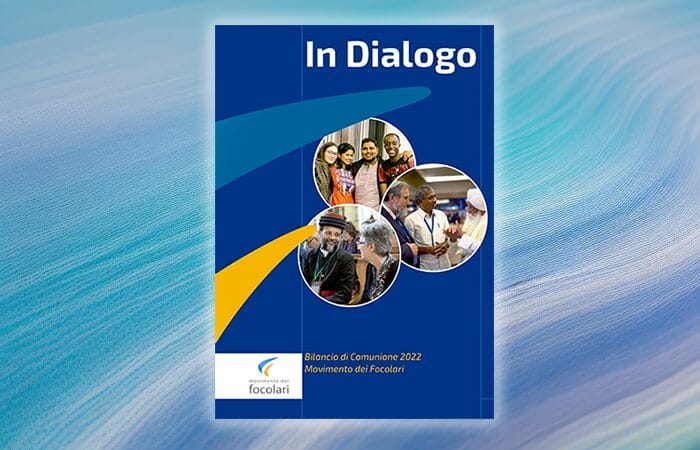
Jan 23, 2024 | Centro internazionale, Cultura, Dialogo Interreligioso, Ecumenism, Non categorizzato
The Focolare Movement has just published its second “Communion in Action Report” or “Mission Report”. It focuses on the theme of Dialogue. To learn more about it, we interviewed Ruperto Battiston and Geneviève Sanze, Counsellors for the Economy and Work aspect of the Movement.
A year ago, in January 2023, at the “Focolare Meeting Point” in Rome, the first “Communion in Action Report” or “Mission Report” of the Focolare Movement was presented. It gave an overview of the worldwide activities and initiatives carried out by the Movement in the biennium 2020-2021. This year, the Movement is presenting a new Report for the year 2022, this time centred on the theme of dialogue. The document has emerged as a fascinating account, not only of the spontaneous sharing of goods but also of experiences and needs, inspired by a lifestyle based on evangelical love. Ruperto Battiston and Geneviève Sanze, Counsellors at the International Centre of the Movement for the aspect of Economy and Work, shared their thoughts with us.
Ruperto, what are the objectives of this document? Is there continuity with the previous one?
These mission reports exist to involve everyone and share information about the concrete achievements resulting from the communion of goods among all the members of the Focolare Movement and the contributions that we receive from individuals or institutions. It is primarily addressed to 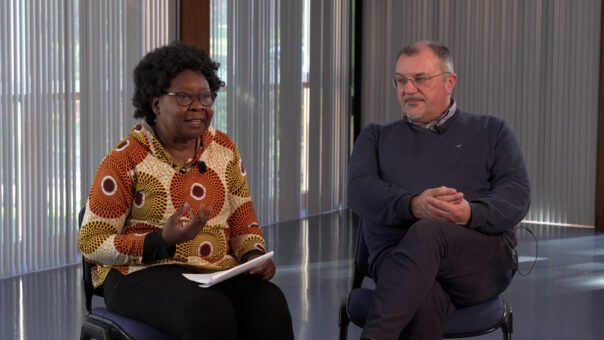 all the members of the Movement, with gratitude for the fruits that the life and work of many people around the world continue to generate; and with gratitude to God for what He has done and continues to do. It is also addressed to those who would like to know more about us and actively collaborate for a more fraternal and peaceful world. This is why we chose the standard, and in this case perhaps somewhat unusual, name of ‘Communion in Action Report’ because we feel it best expresses our experience of walking together towards a united world. This is our second Mission Report’. It refers to the activities supported by the part of the communion of goods which is shared internationally and to the financial data of the Focolare Movement’s International Centre for the year 2022. This Report follows that of 2021, which highlighted the various activities that the communities of the Focolare Movement carry out worldwide in all fields and aspects. For 2022, we focused on a more thematic document, taking the specific perspective of Dialogue and trying to offer a glimpse of what we seek to bring to society on the path towards fraternity, towards that unity in which diversities can be enriched and give rise to harmonious collaborations.
all the members of the Movement, with gratitude for the fruits that the life and work of many people around the world continue to generate; and with gratitude to God for what He has done and continues to do. It is also addressed to those who would like to know more about us and actively collaborate for a more fraternal and peaceful world. This is why we chose the standard, and in this case perhaps somewhat unusual, name of ‘Communion in Action Report’ because we feel it best expresses our experience of walking together towards a united world. This is our second Mission Report’. It refers to the activities supported by the part of the communion of goods which is shared internationally and to the financial data of the Focolare Movement’s International Centre for the year 2022. This Report follows that of 2021, which highlighted the various activities that the communities of the Focolare Movement carry out worldwide in all fields and aspects. For 2022, we focused on a more thematic document, taking the specific perspective of Dialogue and trying to offer a glimpse of what we seek to bring to society on the path towards fraternity, towards that unity in which diversities can be enriched and give rise to harmonious collaborations.
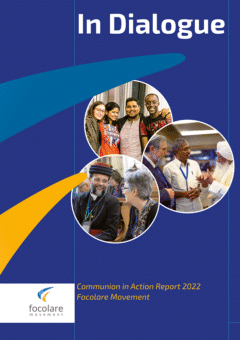 Therefore, this Report serves as an open and hands-on tool of communion to which everyone can add a page, a story or a suggestion, “In Dialogue” with humanity and with our planet.
Therefore, this Report serves as an open and hands-on tool of communion to which everyone can add a page, a story or a suggestion, “In Dialogue” with humanity and with our planet.
Geneviève, how does the theme of dialogue, the heart of this text, fit into this informative tool?
It is interesting to reiterate what it says in the introduction: “Being in dialogue is the characteristic of every person and every project which is under the auspices of the Focolare Movement and which is inspired by its spirituality of communion. Not just doing, therefore, but a lifestyle which is supported and substantiated by listening, welcoming, compassion, charity and mercy, as summarized in the cardinal principle of every culture and religion: the so-called Golden Rule ‘do unto others as you would have them do unto you.'” This Mission Report aims to show how, together with many others throughout the world, we have contributed to healing the wounds of divisions and polarizations and to progressing along the path of evangelical fraternity. We express dialogue in five major areas: in the Catholic Church, among Christian Churches, in the field of interreligious dialogue, with people without a religious reference and in different cultural contexts. For us, these areas are the main ways to reach fraternity. Chiara Lubich defined dialogues as ‘highways to a united world’. It was not easy to gather and choose from the numerous initiatives, small and large but all important because they are seeds of the future and bearers of a concrete change in relationships between people, improving the atmosphere of the world. We were amazed by the quantity of initiatives and the widespread flourishing of this life, which may not make noise but which supports the world and builds new relationships between people. Being “In Dialogue” with others values diversity, highlights the characteristics of each one, requires deep mutual listening, and builds peace. Dialogue is more relevant than ever. To read the Mission Report in English, click here.
Maria Grazia Berretta
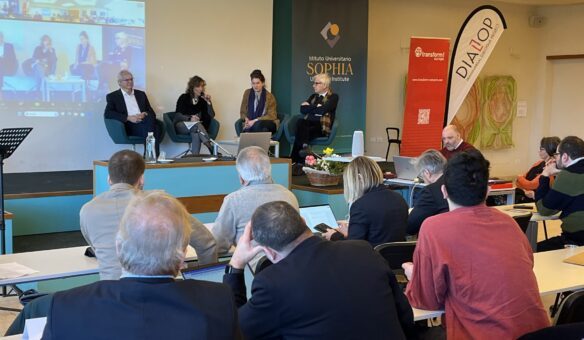
Jan 22, 2024 | Non categorizzato
An audience with Pope Francis on Wednesday 10 January followed by three days of reflection at the Conference on Integral Ecology at the Sophia University Institute in Loppiano. Two fundamental stages on the path of dialogue between Catholics and Marxists on important issues, beginning with peace.
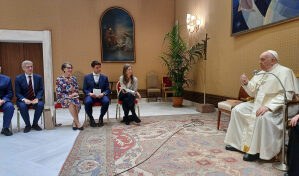
Foto Giulio Meazzini
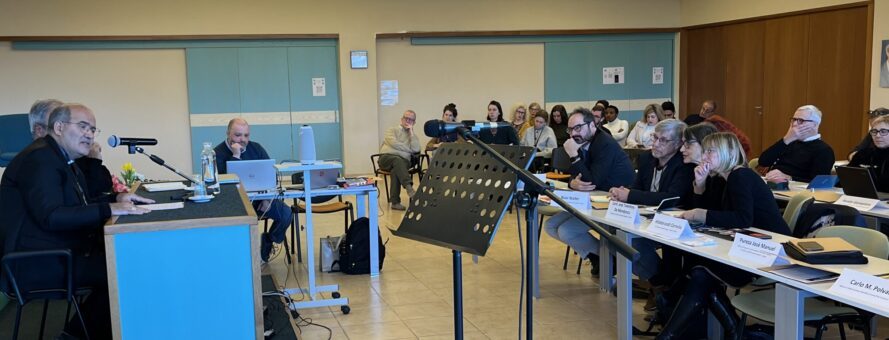
Foto Paolo Lòriga (2)
 A further indication of the importance attributed to the Dialop experience lies in the presence of the Secretary General of the Commission of the Bishops’ Conferences of the European Union, Spanish priest Manuel Barrios Prieto, on each of the 3 days of the conference. He spoke at the concluding phase of the conference. Great attention, therefore, was paid to Dialop’s commitment to formulating a transversal social ethical programme as the fruit of dialogue between the Social Thought of the Catholic Church and Marxist Social Critique – ethics enlightened by the vision of integral ecology proposed by Pope Bergoglio. Ten years ago, neither Walter Baier, a Marxist politician and current president of the European Left, nor Franz Kronreif, an architect and member of the Focolare Movement, both from Austria, who both initiated Dialop would ever have imagined the results of this 2024 stage. ‘The meeting with Pope Francis,’ Baier remarked, ‘opens a new chapter between the Left in Europe and the Catholic Church. And what has matured at Sophia marks the development of that dialogue because it showed how rich the knowledge we are able to mobilise is’. A particular perspective has also opened up for Kronreif: ‘Based on the path we have been able to take and the experience we are gaining, we can expand to other dialogues or integrate other subjects into our dialogue to safeguard the people, nature, justice and peace’.
A further indication of the importance attributed to the Dialop experience lies in the presence of the Secretary General of the Commission of the Bishops’ Conferences of the European Union, Spanish priest Manuel Barrios Prieto, on each of the 3 days of the conference. He spoke at the concluding phase of the conference. Great attention, therefore, was paid to Dialop’s commitment to formulating a transversal social ethical programme as the fruit of dialogue between the Social Thought of the Catholic Church and Marxist Social Critique – ethics enlightened by the vision of integral ecology proposed by Pope Bergoglio. Ten years ago, neither Walter Baier, a Marxist politician and current president of the European Left, nor Franz Kronreif, an architect and member of the Focolare Movement, both from Austria, who both initiated Dialop would ever have imagined the results of this 2024 stage. ‘The meeting with Pope Francis,’ Baier remarked, ‘opens a new chapter between the Left in Europe and the Catholic Church. And what has matured at Sophia marks the development of that dialogue because it showed how rich the knowledge we are able to mobilise is’. A particular perspective has also opened up for Kronreif: ‘Based on the path we have been able to take and the experience we are gaining, we can expand to other dialogues or integrate other subjects into our dialogue to safeguard the people, nature, justice and peace’.
Paolo Lòriga
Full interview with Walter Baier and Franz Kronreif For more on Dialop: https://www.focolare.org/en/2023/04/17/dialop-dialogo-tra-cristiani-e-sinistra-europea-in-cerca-di-un-vero-cambiamento/ https://www.focolare.org/en/2023/08/04/la-comunicazione-in-tempo-di-guerra-un-dialogo-trasversale-per-unetica-comune/
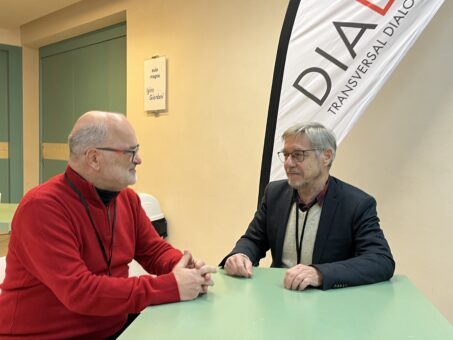
Jan 22, 2024 | Non categorizzato
Over 10 years ago, Walter Baier and Franz Kronreif embarked on a journey between Marxists and Catholics in Vienna with the aim – bold then and bold now – of working out a shared social ethic on the basis of a cross-party project of dialogue, called Dialop, which was launched in 2014. Baier, a politician, is currently president of the European Left, Kronreif is an architect and a member of the Focolare Movement. What were the results of the conference held in the past few days for Dialop’s journey? Baier: ‘It is difficult for me to give an answer in this moment because we still have to evaluate things between us. I have read Pope Francis’ address to us several times and each time I’ve discovered something new. This means that we have to let this speech sink in and think about it carefully. Certainly, however, the meeting with the Pope opens a new chapter between the Left in Europe and the Catholic Church. The Pope spoke about the very things that move us too, namely the preferential option for the poor, the defence of Mother Earth, the rights of migrants, the right to life’. Kronreif: “What impressed me most was that the Pope really wanted this meeting with a representation from Dialop. Right from the start we saw that he felt very comfortable with our group, half Catholic, half Marxist. He spoke very freely and also built relationships by accepting questions. He urged us to continue the dialogue, because dialogue is fundamental today. He also emphasised the fight against corruption. And then he invited us to dream of a better future, because with dreams we can manage to break the mould’.  Baier: ‘What happened at the Sophia University Institute in Loppiano is also very important. I think it is a new stage in the dialogue. It shows how rich the knowledge we can mobilise is. The precondition for this is that we managed to create a space in which all participants were able to express themselves. On the Marxist side, every contribution was unorthodox. If we had said these things decades ago in our socialist or communist parties, we would have been ousted’. Can you give an example? Baier: ‘How we were able to act as Marxists with the leadership of the Catholic Church is unprecedented. And then the self-criticism we began to do about our contradictions. This is only possible with the kind of dialogue we have created at Sophia. And I stress that in this experience of dialogue, the other side is able to bring out the best part of us’. What prospects have opened up with this stage at the start of 2024? Baier: ‘For me, as a politician, it is important that we succeed in mobilising society and public opinion on topics of justice, integral ecology, and above all peace. Although we should have no illusions. It is not so much a matter of speeches as a confrontation with strong powers. This requires democratic decisions and we need majorities on these issues. I think we must develop our dialogue in this direction’. Kronreif: ‘The perspective that emerged is that we have found that in our dialogue we manage to create an experience of true encounter that can be extended to other dialogues or integrate other subjects into our dialogue. By now we have such a deep-rooted and lived method and experience that we are more open to integrating other components. And it may turn out to be a useful democratic method to deal with and address certain issues in parliaments, society and public opinion, where a very wide split and radicalisation into extreme positions now prevails’.
Baier: ‘What happened at the Sophia University Institute in Loppiano is also very important. I think it is a new stage in the dialogue. It shows how rich the knowledge we can mobilise is. The precondition for this is that we managed to create a space in which all participants were able to express themselves. On the Marxist side, every contribution was unorthodox. If we had said these things decades ago in our socialist or communist parties, we would have been ousted’. Can you give an example? Baier: ‘How we were able to act as Marxists with the leadership of the Catholic Church is unprecedented. And then the self-criticism we began to do about our contradictions. This is only possible with the kind of dialogue we have created at Sophia. And I stress that in this experience of dialogue, the other side is able to bring out the best part of us’. What prospects have opened up with this stage at the start of 2024? Baier: ‘For me, as a politician, it is important that we succeed in mobilising society and public opinion on topics of justice, integral ecology, and above all peace. Although we should have no illusions. It is not so much a matter of speeches as a confrontation with strong powers. This requires democratic decisions and we need majorities on these issues. I think we must develop our dialogue in this direction’. Kronreif: ‘The perspective that emerged is that we have found that in our dialogue we manage to create an experience of true encounter that can be extended to other dialogues or integrate other subjects into our dialogue. By now we have such a deep-rooted and lived method and experience that we are more open to integrating other components. And it may turn out to be a useful democratic method to deal with and address certain issues in parliaments, society and public opinion, where a very wide split and radicalisation into extreme positions now prevails’.
Paolo Lòriga

 “During this meeting we had the opportunity to share our most important personal experiences in view of Genfest 2024,” Mariane (Brazil) tells us. Moreover,” she continues, “I perceived that we were in a welcoming environment that reflected the diversity and interculturality that also characterizes us at the International Focolare Center. “It was my first time attending a meeting at the Vatican,” says Sole, representing the youths of Asia. “Previously I thought the Church was serious and authoritative. Instead, I was struck by this desire to listen to the voices of young people.” The young people, after introductions and initial moments of exchange, were able to discuss various topics with those present. “The members of the Office, together with Fr. Chagas, told us about the work done for World Youth Day (WYD) held in 2023 in Lisbon (Portugal),” says Maria José (Venezuela), “and invited us to tell what the experience was like for those of us who were able to participate. Finally, we talked about our work for Genfest in its different phases. What struck me most was feeling the family atmosphere. They expressed their great confidence in the project we are pursuing. We are aware that there are challenges, but this is also a richness that invites us to move forward.” “Juntos para cuidar” (Together to care) is the theme chosen for the upcoming Genfest, and it was precisely the concept of “togetherness,” of “synodality,” that became a point of great reflection during this meeting. “During this dialogue,” David (Venezuela) recounts, “Secretary Gleison De Paula Souza mentioned the Gospel of Mark (cf. Mk. 10:46-52), in which the blind Bartimaeus is mentioned. He used this biblical passage to talk about synodality, about going to those who are rejected to welcome them and make them feel loved. I had the feeling that God was saying, ‘This is the path we must follow. Moreover, I think that, every day, we can meet people who are inspired by the Holy Spirit and, as a Church, we have to be open to listen to everything that comes from outside as well. This is synodality for me.” In her experience, however, Masha (Russia) who belongs to the Russian Orthodox Church, synodality is walking together in diversity without fear: “It is going out to meet the other, finding a common language, the one that comes directly from each person’s heart; it is going out to meet a brother or sister of a different denomination, a non-believer, but without effort. Only with the desire to witness and go. There will be no future if we do not make this journey together.” At the conclusion of this moment, Father João Chagas, head of the Office expressed his joy for this moment of such a participatory and lively exchange, a moment that enriched him personally. We share in the following video some impressions about it and his best wishes for the upcoming Genfest.
“During this meeting we had the opportunity to share our most important personal experiences in view of Genfest 2024,” Mariane (Brazil) tells us. Moreover,” she continues, “I perceived that we were in a welcoming environment that reflected the diversity and interculturality that also characterizes us at the International Focolare Center. “It was my first time attending a meeting at the Vatican,” says Sole, representing the youths of Asia. “Previously I thought the Church was serious and authoritative. Instead, I was struck by this desire to listen to the voices of young people.” The young people, after introductions and initial moments of exchange, were able to discuss various topics with those present. “The members of the Office, together with Fr. Chagas, told us about the work done for World Youth Day (WYD) held in 2023 in Lisbon (Portugal),” says Maria José (Venezuela), “and invited us to tell what the experience was like for those of us who were able to participate. Finally, we talked about our work for Genfest in its different phases. What struck me most was feeling the family atmosphere. They expressed their great confidence in the project we are pursuing. We are aware that there are challenges, but this is also a richness that invites us to move forward.” “Juntos para cuidar” (Together to care) is the theme chosen for the upcoming Genfest, and it was precisely the concept of “togetherness,” of “synodality,” that became a point of great reflection during this meeting. “During this dialogue,” David (Venezuela) recounts, “Secretary Gleison De Paula Souza mentioned the Gospel of Mark (cf. Mk. 10:46-52), in which the blind Bartimaeus is mentioned. He used this biblical passage to talk about synodality, about going to those who are rejected to welcome them and make them feel loved. I had the feeling that God was saying, ‘This is the path we must follow. Moreover, I think that, every day, we can meet people who are inspired by the Holy Spirit and, as a Church, we have to be open to listen to everything that comes from outside as well. This is synodality for me.” In her experience, however, Masha (Russia) who belongs to the Russian Orthodox Church, synodality is walking together in diversity without fear: “It is going out to meet the other, finding a common language, the one that comes directly from each person’s heart; it is going out to meet a brother or sister of a different denomination, a non-believer, but without effort. Only with the desire to witness and go. There will be no future if we do not make this journey together.” At the conclusion of this moment, Father João Chagas, head of the Office expressed his joy for this moment of such a participatory and lively exchange, a moment that enriched him personally. We share in the following video some impressions about it and his best wishes for the upcoming Genfest. 

 This is well known by the friends of the Focolare Movement community in Mexico City who, a few months ago, organized a day of dialogue among Christians of various Churches linked to the World Day of Prayer for the Care of Creation in collaboration with the Integral Ecology Commission of the Archdiocese of Mexico City. After an initial time of prayer in the beautiful chapel of the Archdiocesan Minor Seminary, participants went on an ecological walk led by some women from different indigenous communities. Indeed, these communities have a deep relationship with Creation, which they manifest with symbols, songs and prayers in their languages. Particularly, it became evident how water is an essential element for the life of all living beings without distinction. And the symbol of flowing water – an ecological, life-giving and synodal image – was echoed when, thirsty after the walk, the leaders of the Churches present – Anglican bishops of Mexico and priests of the Orthodox Church of America – took earthenware jugs to serve drinks to each of those present, also in small earthenware cups.
This is well known by the friends of the Focolare Movement community in Mexico City who, a few months ago, organized a day of dialogue among Christians of various Churches linked to the World Day of Prayer for the Care of Creation in collaboration with the Integral Ecology Commission of the Archdiocese of Mexico City. After an initial time of prayer in the beautiful chapel of the Archdiocesan Minor Seminary, participants went on an ecological walk led by some women from different indigenous communities. Indeed, these communities have a deep relationship with Creation, which they manifest with symbols, songs and prayers in their languages. Particularly, it became evident how water is an essential element for the life of all living beings without distinction. And the symbol of flowing water – an ecological, life-giving and synodal image – was echoed when, thirsty after the walk, the leaders of the Churches present – Anglican bishops of Mexico and priests of the Orthodox Church of America – took earthenware jugs to serve drinks to each of those present, also in small earthenware cups.  The concluding fraternal agape was a time of exchange and closeness, sharing of dreams and possible future plans. Among those present were the Anglican Primate of Mexico, the Catholic Bishop of Mexico City, an Anglican deaconess, some members of the Antiochian Orthodox Church, Catholic priests from the diocesan offices for Ecumenism, Youth Ministry and Care of Creation a group from the Community of Sant’Egidio, some members of the Commission for Integral Development of the Catholic Bishops’ Conference of Mexico, the Mexican Institute of Social Doctrine, and the Pastoral Care of Indigenous People. It was a moment of great unity in which everyone could see that it is worthwhile to spare no effort to help generate a dialogue of life in Mexico and everywhere.
The concluding fraternal agape was a time of exchange and closeness, sharing of dreams and possible future plans. Among those present were the Anglican Primate of Mexico, the Catholic Bishop of Mexico City, an Anglican deaconess, some members of the Antiochian Orthodox Church, Catholic priests from the diocesan offices for Ecumenism, Youth Ministry and Care of Creation a group from the Community of Sant’Egidio, some members of the Commission for Integral Development of the Catholic Bishops’ Conference of Mexico, the Mexican Institute of Social Doctrine, and the Pastoral Care of Indigenous People. It was a moment of great unity in which everyone could see that it is worthwhile to spare no effort to help generate a dialogue of life in Mexico and everywhere. 
 all the members of the Movement, with gratitude for the fruits that the life and work of many people around the world continue to generate; and with gratitude to God for what He has done and continues to do. It is also addressed to those who would like to know more about us and actively collaborate for a more fraternal and peaceful world. This is why we chose the standard, and in this case perhaps somewhat unusual, name of ‘Communion in Action Report’ because we feel it best expresses our experience of walking together towards a united world. This is our second Mission Report’. It refers to the activities supported by the part of the communion of goods which is shared internationally and to the financial data of the Focolare Movement’s International Centre for the year 2022. This Report follows that of 2021, which highlighted the various activities that the communities of the Focolare Movement carry out worldwide in all fields and aspects. For 2022, we focused on a more thematic document, taking the specific perspective of Dialogue and trying to offer a glimpse of what we seek to bring to society on the path towards fraternity, towards that unity in which diversities can be enriched and give rise to harmonious collaborations.
all the members of the Movement, with gratitude for the fruits that the life and work of many people around the world continue to generate; and with gratitude to God for what He has done and continues to do. It is also addressed to those who would like to know more about us and actively collaborate for a more fraternal and peaceful world. This is why we chose the standard, and in this case perhaps somewhat unusual, name of ‘Communion in Action Report’ because we feel it best expresses our experience of walking together towards a united world. This is our second Mission Report’. It refers to the activities supported by the part of the communion of goods which is shared internationally and to the financial data of the Focolare Movement’s International Centre for the year 2022. This Report follows that of 2021, which highlighted the various activities that the communities of the Focolare Movement carry out worldwide in all fields and aspects. For 2022, we focused on a more thematic document, taking the specific perspective of Dialogue and trying to offer a glimpse of what we seek to bring to society on the path towards fraternity, towards that unity in which diversities can be enriched and give rise to harmonious collaborations.



